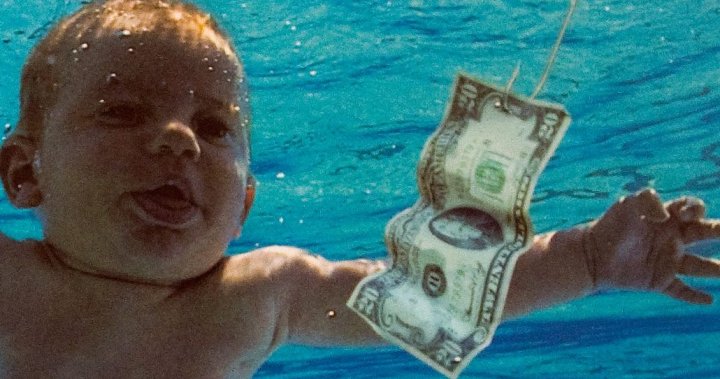A federal appeals court is reviving the child pornography lawsuit filed against Nirvana by a now-32-year-old man who appeared naked on the cover of the band’s 1991 album Nevermind when he was a four-month-old baby.
Spencer Elden’s lawsuit against the grunge rock group alleges that he has suffered “permanent harm” as the band and others profited from the naked image of him swimming underwater in a pool, appearing to grab for a dollar bill on a fish hook.
Elden said his parents earned a mere US$200 for the photoshoot that created the iconic album cover, which has sold over 30 million copies.
Elden first sued the band in 2021, but a federal judge in California threw out the lawsuit in 2022. A revised lawsuit was filed, but that too was dismissed on grounds that it was outside the 10-year statute of limitations on one of the laws used as a cause of action.
On Thursday, a panel of three judges on the Ninth U.S. Circuit Court of Appeals said “never mind” to that decision and ruled that Elden can move forward with his lawsuit against Nirvana. The case has been sent back to federal court in Los Angeles.
The appellate panel found that each republication of an image of child pornography “may constitute a new personal injury” with a new deadline for the statute of limitations. The court’s decision noted that the naked photo in contention was republished in 2021 when Nirvana reissued Nevermind for its 30th anniversary.
Nirvana band members Krist Novoselic, from left, Dave Grohl and Kurt Cobain pose after receiving the award for best alternative video for “In Bloom” at the 10th annual MTV Video Music Awards on Sept. 2, 1993.
AP Photo/Mark J. Terrill, File
“Like victims of defamation, victims of child pornography may suffer a new injury upon the republication of the pornographic material,” the court’s decision reads.
“We conclude that each republication of child pornography can constitute a new personal injury analogous to injuries caused by defamation and other dignitary torts. This conclusion is consistent with the Supreme Court’s view that ‘every viewing of child pornography is a repetition of the victim’s abuse.’”
Apart from the 30th anniversary reissue of the Nevermind album cover, the court notes that “the band and the album’s producers have licensed the cover image for various other merchandise, including Snapchat filters, t-shirts, and posters.”
The court’s decision merely deals with whether or not Elden’s lawsuit can move forward.
“The question whether the Nevermind album cover meets the definition of child pornography is not at issue in this appeal,” the court wrote.
In an email to The Associated Press, Nirvana lawyer Bert Deixler called the ruling a “procedural setback.”
“We will defend this meritless case with vigor and expect to prevail,” he wrote.
— With files from the Associated Press
© 2023 Global News, a division of Corus Entertainment Inc.




